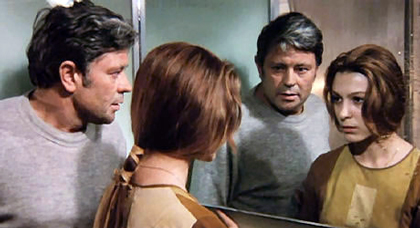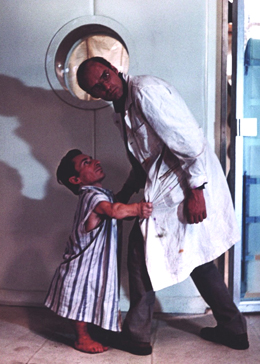
 |
|
|
|
When their books are adapted for the movies, science fiction authors are accustomed to seeing their intellectual ideas jettisoned in favor of car chases, ray-gun shootouts and vast conspiracies. Andrei Tarkovsky's 1972 Soviet film Solaris ignores the space hardware and action possibilities in Polish author Stanislaw Lem's celebrated 1961 novel and replaces it with more philosophical musings about man's inability to understand his own existence or to communicate with other life forms. A spectacular space film with a cerebral agenda, this original Solaris fascinated audiences with its radical contrast to Stanley Kubrick's 2001: A Space Odyssey. Both films take men across the universe to encounter an inscrutable alien intelligence, and the lavish Russian movie regards the same cosmic mystery from a radically different perspective. 
Lem's scientific investigation of an enigmatic planet has been pared down to the subjective experience of one very perplexed cosmonaut. Psychologist Kris Kelvin (Donatas Banionis) makes the journey to a space platform orbiting Solaris to help decide if the station should be shut down. The scientific investigation called Solaristics has reached a dead end because all previous observers have lost their objectivity. Although all still believe that the oceans of Solaris may be a gigantic living being, all who has journeyed to the station have suffered from hallucinations. The unhappy Berton (Vladislav Dvorzhetsky) claims to have seen the ocean 'communicating' via huge plastic sculptures that erupt from the planet's liquid surface. Kelvin expects to find three scientists at the station, but his old friend Dr. Gibaryan (Sos Sarkisyan) has killed himself. The remaining two, Dr. Snauth and Dr. Sartorius, are living with people who appear to be humanoid simulacra created by the ocean below. As neither scientist will discuss the phantom beings, Kelvin is unprepared to be suddenly confronted by his own wife, Hari (Natalya Bondarchuk), who simply appears in a locked room. Since the real Hari committed suicide ten years previously on Earth, Kelvin doesn't know how to react to this living, breathing copy -- that is indeed synthetic. Kelvin's mysterious visitor can't drink or eat, and wears a dress with no provision for unfastening. And she's desperate not to be separated from Kelvin. Solaris was considered a perplexing, mysterious Russian response to Kubrick's film. Tarkovsky gives us some very impressive space station sets and a number of dreamlike visions of the liquid surface of the planet below, but viewers hoping for 2001- like technology will be disappointed. Tarkovsky shows no interstellar space ship; most of the voyage to Solaris is covered in a single static shot of stars. The lonely void of space is instead suggested by long pauses, and odd scenes such as a POV car ride into a city on a complex freeway system. The futuristic city is a simply a present-day metropolis in Japan. 
Kubrick and Arthur C. Clarke's lonely astronaut travels to the end of the universe to find that our entire race is the pawn of god-like extra-terrestrials with a master plan for our 'Childhood's End'. Tarkovsky's film brings Kelvin and his colleagues face to face with an intelligent life form so different from our own that it defeats all attempts at communication, analysis and understanding. Earthly instruments of observation are useless with a "sentient ocean" that operates beyond our range of comprehension. This ocean's form of communication is to create physical things from our own thoughts and memories. All of the cosmonauts are joined by artificial people apparently conjured from their own memories. Science fiction readers will recognize this idea from Ray Bradbury's novel The Martian Chronicles or even the inept space opera Journey to the 7th Planet, stories in which alien intelligences defend their turf by confronting Earthly invaders with hallucinations extracted from their own minds. 2001's alien Overlords do this as well by constructing a "non-threatening" habitat for astronaut Dave Bowman, an ornate room-prison. But the Solaris ocean creates living beings, not hallucinations. Kelvin's 'visitor' is a duplicate of his lost spouse, a clone. She appears from Kelvin's sleep, as if he had to be unconscious for the ocean to reach into his mind for the Hari blueprint. This detail resonates with the sinister Pods of Invasion of the Body Snatchers, organic invaders that copy humans while they sleep. Although the long-dead "real" Hari committed suicide, Hari #2 has almost no memory beyond her love for Kelvin, and cannot bear to be separated from him. When a metallic door gets in her way, she rips through it, seriously cutting herself. Kelvin is shocked when her wounds heal themselves in a matter of minutes. Convinced she's a lamia up to no good, Kelvin packs her away in a rocket, only to have a Hari #3 soon materialize out of nowhere, as in a Tex Avery Droopy cartoon. Each new Hari seems to have a memory of the last, and is capable of more human reactions. She's a product of Kelvin's guilty memory, yet not a phantom -- when the first duplicate is disposed of, he's left with an extra shawl and dress. We only see glimpses of the "visitors" co-habiting with the other scientists. They cannot be hallucinations, because Gibaryan's 'visitor' was a young girl whose image is recorded on videotape. The other, mostly unseen visitors are troublemakers that physically abuse their hosts. Kelvin's colleagues theorize that the visitors are reflections of their deepest personal issues. Sartorius has photos of children in his room and his visitor is briefly revealed to be a dwarf. Did the ocean fail in its first attempt at creating a human child? Hari and the other visitors are aliens, or agents of the alien consciousness, through which Solaris learns the nature of Man. 
Kelvin's waking nightmare is a dilemma straight from Alfred Hitchcock's Vertigo. Permanently demoralized over the original Hari's death, he nevertheless "murders her again". Just as Scotty Ferguson created a new Madeleine, Kelvin is given multiple chances to recreate his lost relationship. The character of Hari/Solaris is one of the better female roles in Science Fiction. The spectacle of the frozen woman jerking back to life in a spasmodic frenzy is simultaneously disturbing and erotic. Kelvin likewise warms to Hari and is willing to accept her for what she is, ignoring Snauth's warning that she'll cease to exist should he attempt to return her to Earth. But Hari #3 eventually recovers all of Hari #1's traits, including the original's disillusionment and despair. Author Stanislaw Lem reportedly complained that Tarkovsky's film had substituted a humanist theme for his story's scientific riddle. The film's dialogue scenes are slow philosophical discussions. There are several allusions to Don Quixote and the cosmonauts quote Cervantes' poetry on the subject of sleep. Compared to the alien ocean, the film seems to say, human beings are limited creatures imprisoned and isolated in physical bodies. As researchers, the aliens appear to be learning a lot about our limitations and self-defeating, destructive social organization. The only research idea that mission control suggests is to blast the ocean with X-Rays, and "see what happens". Tarkovsky's slow pace will be stultifying to average audiences. Scenes play out in uncut takes, often minutes in length. On Earth, Kelvin stares endlessly at underwater reeds that sway with the rhythms of the liquid surface of Solaris. At one point we watch Kelvin sleep for more than a minute. Viewers will also need to stretch their imaginations to understand the changes happening in the space station. We begin by wondering where the fresh fruit and flowers are coming from. After a few minutes, observant viewers will notice that the sets shift character and reality like something out of a Philip K. Dick novel. Artifacts from Kelvin's Russian home show up, including a religious Icon accompanied by Andrei Rublev-like music. When Kelvin hallucinates, anything goes: a painting of a snow scene becomes confused with his memories and old home movies. The Russian actors playing the scientists do a fine job of withholding key information. Just what does Snauth have hidden in his room? A giant toad? Brigitte Bardot? Leading player Donatas Banionis is soulful and sober, although we would be gratified if he smiled just once or twice. But the film's emotional center belongs to the captivating Natalya Bondarchuk. She's heartbreaking as a devoted zombie who slowly evolves into a woman with a full personality. Yet she is also a manifestation of a potentially benign alien intelligence that might be trying to help Kelvin as well as study him. 
Criterion's Blu-ray of Solaris is a substantial improvement over their DVD special edition from 2002, with better color and a more stable image. We're also informed that monochrome sections left neutral or tinted sepia in the earlier disc are now corrected to the film's original light blue. With the added resolution of HD, the views of the Solaris ocean are fascinating. They look like high-speed photography of oils or in a large pool. As with all Criterion upgrades, the original extras have been retained. An insert booklet contains an essay by Philip Lopate and an article by Akira Kurosawa on his trip to Moscow. A good commentary by Tarkovsky authors Vida Johnson and Grahame Petrie points out dozens of production details and puzzling inconsistencies in the film's logic. Interviews are included with the cinematographer, the art director, the composer and Natalya Bondarchuk, who was 18 years old when filming began. A too-brief excerpt from a Polish docu on Stanislaw Lem shows the author shoveling snow and griping about the liberties taken with his book. And finally, nine deleted or altered scenes are present. It's hard to tell what the differences are in some of them; the only obvious one is a text opening that the director deemed unnecessary. Unlike any science fiction film made in the West or in the Soviet bloc, Solaris is a heady philosophical meditation, and a key film from the visionary Andrei Tarkovsky.
has Savant's memories of Solaris' awkward U.S. premiere at FILMEX in 1972.
On a scale of Excellent, Good, Fair, and Poor,
Solaris Blu-ray rates:
Reviews on the Savant main site have additional credits information and are often updated and annotated with reader input and graphics. Also, don't forget the 2010 Savant Wish List. T'was Ever Thus.
Review Staff | About DVD Talk | Newsletter Subscribe | Join DVD Talk Forum |
| ||||||||||||||||||